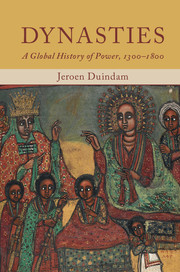Book contents
3 - At court: spaces, groups, balances
Published online by Cambridge University Press: 05 October 2015
Summary
Wearing a red hat the cockman accompanies the indications of dawn;
The wardrobe master now enters with the cloud-green furs.
The nine heavenly gates open to the palace court,
Ten thousand nations' robes and caps bow to the imperial cap and tassel.
The sun's rays at this moment reach the fairy hands;
Incense smoke floats around the dragon on the emperor's gown.
After the morning audience, you must cut open the five-colored imperial decrees,
And to the sound of jade pendants return to your office beside the Phoenix Pool.
Poem on the morning audience at the Tang Daming palace,
by Wang Wei (699–759), in Wang Wei, trans. Marsha L. Wagner (Boston, MA, 1981), 66–7.Court: a universal term?
Many names have been devised for individuals wielding power: king and emperor; emir, sultan, shah, padishah and shahanshah, khan, khagan, raja, wang, huangdi, tianzi, tenno, huey tlatoani, Sapa Inka, and endless other variants. Huge differences exist between the cultural associations of these terms as well as between the levels of power of the incumbents. The single term emperor in the European context, from Augustus via Charlemagne and his Byzantine contemporaries to Napoleon and beyond, includes powerful military leaders, ritual figureheads, and bureaucratically minded managers. African names for paramount leaders, from the nagast (kingemperor) of Ethiopia to the mukama of Bunyoro or the Asante asantehene, each indicate different positions, and they change over time. Nevertheless, the concept of a single dignitary, an anthropomorphic ‘head' of the body politic, is present in all these names. Likewise, the king's kin has been labelled in many ways, often with distinct badges for sons, brothers, and sons of brothers. Special titles could be given to the heir-apparent, the queen mother, and other special positions. The group of royals was determined by choices involving heredity and personal qualification, by distinct patterns of descent, and by policies vis--vis collaterals. While the results varied greatly, the idea of a clan deriving its authority in part from a mythical or historical ancestor can be found in many places.
Polities across the globe have been described in European terminology. The Dutch physician and writer Olfert Dapper (1636–89) compiled travellers' accounts without ever visiting the numerous territories he described. His ‘Accurate description’ of Africa sometimes explicitly contrasted distant examples with European models.
- Type
- Chapter
- Information
- DynastiesA Global History of Power, 1300–1800, pp. 156 - 226Publisher: Cambridge University PressPrint publication year: 2015



